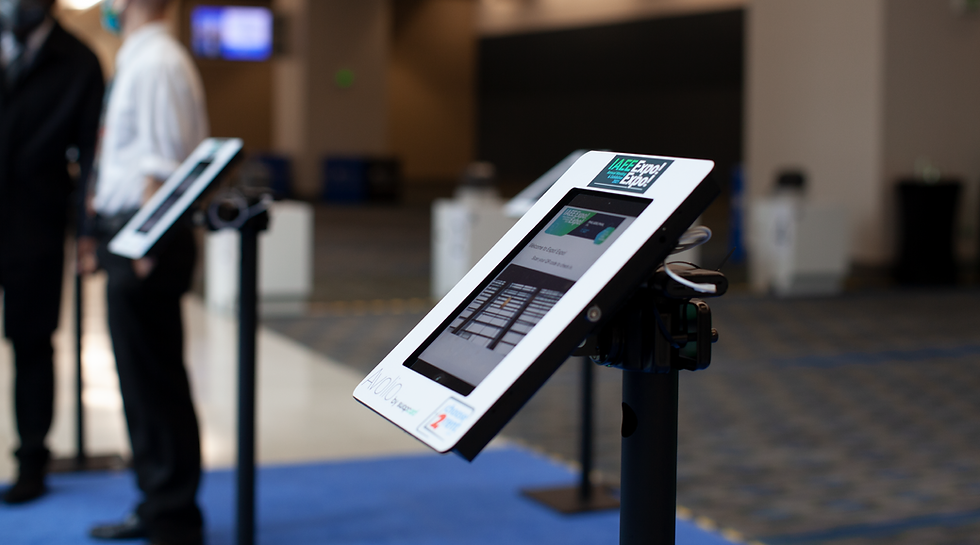6 pieces of tech for a more sustainable event
- Nov 17, 2022
- 4 min read
Updated: Jul 25, 2025
Technology has impacted every industry and individual in the last 20 years, and looks to continue to keep growing at an exponential rate. One of the slightly lesser impacted industries has been the events industry, but there is still a lot of potential and scope for technology in the sector. This has been shown recently when through the pandemic, a digital acceleration towards technology took place, bringing elements of tech to be embedded within virtual, live and hybrid events and we are looking forward to watching this continue over the next few years.
There are a number of benefits to utilising technology in an event including greater insights through data analytics, enhanced attendee experience, more streamlined registration & communications and increased sustainability. In fact, technology is a proven and effective way of modernising your event whilst reducing carbon emissions and physical waste. And although technology is often seen as essential within most events, it is still mostly underused in modern day conferences, exhibitions and incentive travel!
We wanted to share with you some of the ways you can use technology to make your event more sustainable.
Mobile Event Apps

Let’s start with the most obvious one. As nearly everyone now owns and carries a smartphone with them, it would only make sense to utilise this as much as possible. A mobile event app offers an abundance of features including networking elements, data analytics, gamification and interactivity. You can also reduce your print requirements as your app will serve as a hub for your agenda, floor plans and any other relevant information. And to further reduce waste and physical contact in the post-covid world, networking can be digitised allowing delegates to exchange information through scanning QR codes using platforms such as SwapCard.
Live Streaming/Hybrid

After the recent acceleration of virtual events, we now have increased capability to deliver events to a worldwide audience without having to fly them all in to one location. Hybrid events are events that combine a live element and virtual element to reach a wider audience compared to hosting a live event. Utilising video streaming tools and advancements in internet connectivity around the world, we can provide a live stream virtually to a select wider audiences. This in turn reduces venue energy, carbon emissions from travel, food and water waste and general event energy.
Food Technologies

Agriculture for food accounts for 26% of global emissions with almost a quarter of these emissions attributable to feeding livestock. Through innovative techniques, food brands have been able to reduce their reliance on livestock to produce tasty alternatives that are better for the planet without sacrificing taste. Examples include Impossible Foods with their meat-free burgers, Ben & Jerrys with diary-free ice cream that taste nearly as good as the real thing and Quorn with a vast vegan range that can be incorporated into menus with ease. Using these products within your event will reduce overall carbon emissions whilst also serving as a talking point for event attendees. And with lab-grown meats becoming a reality in the not-so-distant future, it’s only a matter of time before F&B at events goes carbon-free.
Electric Vehicles

Electric cars in Europe emit, on average, more than 3 times less CO2 than equivalent petrol cars. In practise, event organisers can encourage attendees to use electric cars to travel to the event, use suppliers that transport equipment and crew in electric vehicles and arrange electric transport for their own staff. It is now easier than ever to opt for electric over petrol, with ride-hailing apps such as Uber and Bolt offering green options, coach hire services such as Westway Coaches operating electric coaches and the increase in adoption of electric cars from brands like Tesla, BMW and Renault.
Renewable Energy

Improvements in renewable energy technologies mean the UK are on track to reach the government’s target of 100% zero carbon free energy production by 2035. A number of hotels, venues and suppliers have now implemented renewable energy methods including solar panels and geothermal systems. As examples, Hotel Jakarta, Amsterdam has solar panels across its roof which convert energy to heat the shower water whereas Iveagh Garden Hotel in Dublin sources all of its energy from a nearby river deep underground. It’s now also easier than ever to switch to a renewable energy supplier such as Ecotricity or Octopus (we use Ecotricity if you're asking!). Make sure that you check in with your suppliers to see if the energy they’re using comes from renewable energy sources to increase the sustainability of your event.
Paperless Registration & Reg Tech

As one of the first touch points during a live event, you can reduce paper usage by providing tickets/registration details digitally. This can be done simply as an email or incorporated into an event app. Once arrived, registration technology can be enabled to print recyclable name badges upon scanning of their code. This can reduce any wasted badges from no shows as only those who turn up receive badges. This can also ease the planning process as everything is done onsite. At the end of the event, be sure to take back any unwanted badges to be recycled or reused depending on the event.
Conclusion
Using technology within your event is a great step towards being more sustainable whilst modernising the event and improving the attendee experience. Working with innovative animation studios such as Myth Studio can bring flair to your event whilst communicating your key messages. Looking at technology options at the conception stage will lead you to mitigate carbon emissions from the beginning, ensuring you set off in the right direction. And as the tech revolution continues to explode, we are sure there will be more options to implement new and exciting technology to complement sustainable practises within the industry.
If you ever want to find out more or discuss any technology options for your next event, we'd love to chat. Drop us a message here, or email us at hello@zentiveagency.com.
Dominic Richards is the co-founder and director of Zentive, a sustainable events agency in London. Dominic has communicated the importance of sustainable events around the industry and beyond, championing the way events can do better for the planet whilst achieving their goals. During this time, he has continued to grow relationships with suppliers and industry professionals whilst delivering innovative, future-thinking events for his clients.
+44 (0)203 026 6124



